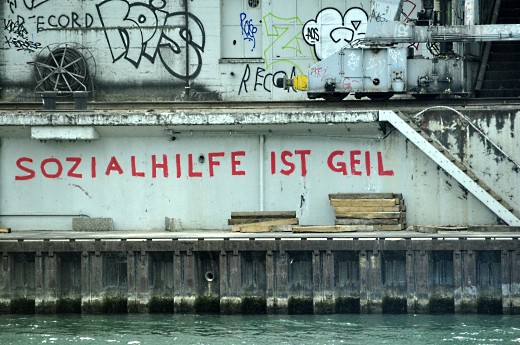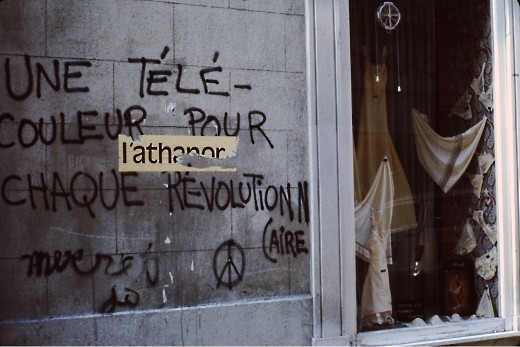Graffiti’s World Reveals Reality
From the desk of George Handlery on Thu, 2012-07-19 15:08
Sprayers disclose a compromising wish list.

Some movements score because they can hide their real agenda. The barefooted opt for them because they are misled to project upon these their desires. By voting accordingly, they mandate what the real intentions of their chosen favorites entail. Our day’s Left is a major beneficiary of the frequent confusion.

Folks that unthinkingly heave into power associations with whose real but ignored agenda they would not knowingly agree, tend to claim “afterwards” that they “had no idea”. Regardless of the mass-murder of right and left totalitarians, the claim is, in many instances understandable. However, the implied excuse is qualified. Not having been able to know does not equal not knowing after the writing appeared on the wall. Ignoring what was known explains some errors of the artificially ignorant. While that condition might mitigate, it does not excuse indirectly mandated crimes. Having said that, an observation needs to be inserted. The claim of ignorance, even if genuine in individual cases, does hardly amount to an absolution.
Your columnist, a committed photographer of landscapes, also likes to record “city landscapes”. Some of the projects are of long standing. The theme, “Facets of the Mountain” took nineteen years to record what one peak had to offer. The project of “Signs” goes back to the seventies; political graffiti is captured wherever the camera takes the observant traveler. Sprayers that live out their “individuality” at the expense of those that endeavor to keep their environment neat. Their activity leaves behind fingerprints that condemn them by divulging what they are after. Two of these serve here as a testimony that the reader can also interpret. Are these a sign of an endured and therefore tacitly supported symptom of the decadence of abused western democracy? Do they reveal the tolerated misuse of social legislation? Are we being told that where there is blood the bloodsuckers congregate? Is arrogance toward those that support the undeserving a natural reaction of insatiable beneficiaries?
The picture at the top of this page has been taken after leaving by boat Basle on the Rhine River. Since three countries, Switzerland, Germany and France meet there, the exact national origin of the message cannot be determined. One graffiti, with the word “rois”, happens to be in French. Nor is the precise location of the apparently German-language wall-defacer of much importance. In fact, the “author” could have been French in spirit. The suspicion is supported by the circumstance that they have just voted in favor of “welfare for everybody”. Still, the best guess is that the sprayer is Swiss. The relative neatness of the red letters points in that direction.
“Sozialhilfe ist geil” is difficult to translate. In recent decades, the meaning of “geil” has changed. However, “welfare is sweet”, or “welfare is great”, possibly “welfare is super”, amounts to an acceptable rendition of the intended point. Indeed, with the spreading of welfarism in societies that feel themselves rich enough to give in to extortion, “welfare” has become a way of life. Here not an existence in poverty is meant. The “victims of profit seeking capitalism” get not only the minimum wage but also supplements for rent, insurance, child support, and whatever.
Not the least one of the benefits is a lot of free time and freedom from “stress”. That comes from having no obligations only rights. The beneficiary can also say that being a recipient makes him into a victim when professional victimhood pays. In addition, avoiding unethical “profit seeking” raises the elevation of the moral high ground that is claimed.
If you add it all up, under prevailing terms, welfare is, truly “super”. Only winning in the lottery without purchasing a ticket can beat the deal.
If you wish, you can read into the message an intent to provoke. After all, its wisdom is hardly directed at those that already enjoy the “life of Riley”. Recruiting, “I want YOU!” style also appears to be superfluous. Ergo, the intended reader is the normal person. That is the dull working bloke who is unable to do anything about his lot given the interest of the political class in discreet abuse.
It is quite possible that those words betray that, certain attitudes that used to be a source of shame, have been recycled by the opinion makers into ethical positions. These advertise the commendable inner qualities of their practitioners. The list includes symbolic and actual acts of treason that can convey status and fame upon one that in earlier times would have been ostracized.

The next picture is a bonus for those that have dug their way through the textual abstractions that accompanied the first image. Having persevered, you deserve a reason to smile. In truth, the bit about the “smile” rests on a hunch. It is a guess that this sprayer, located in the south of France, might have been trying to pillory the demands of the welfare class. Well, at least, inspired by the store’s offerings on the right, not „C-cups for all“ are formulated as a non-negotiable demand. There are arguments against the insinuated humor. However, the “peace sign” left behind the author could be significant. It indicates that we have to do with a programmatic commitment undaunted by the absurdity of the demand. Let us skip here the discussion of the “peace sign” that consists of a code for “N” and “D” meaning “nuclear disarmament”. In practice that naturally meant the disarmament of the West and not the USSR.
For those that do not speak French and that have therefore been kept in the dark regarding the message, it is time to give access. This sprayer cries out “A color TV for every revolutionary”. This appeal closes a logical circle. “Super” life freed from tedious chores and worries, “sun fun, and nothing to do” creates a need. With time on ones hand, the threat of boredom arises. Needed is an opportunity to enjoy time by filling it with entertainment. A new human need, and therefore an unalienable right is discovered. The need expressed justifies the distribution of a box at which to stare. It might also be true that “revolutions” are more enjoyable if “presented to you in living color”.
